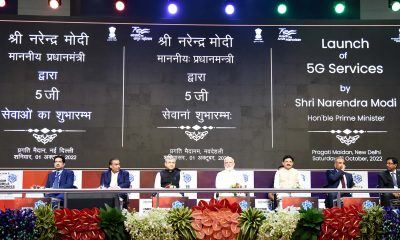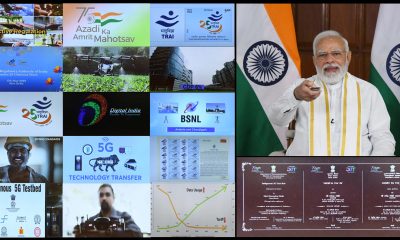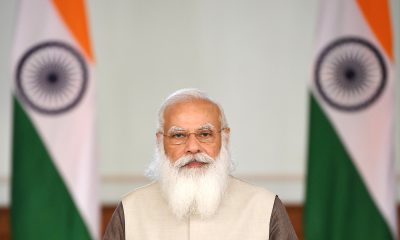News
Prime Minister of India interacts with Startups

NEW DELHI: The Prime Minister Narendra Modi interacted with Startups today via video conferencing. The Startups gave presentations to the Prime Minister on six themes viz. Growing from Roots; Nudging the DNA; From Local to Global; Technology of Future; Building Champions in Manufacturing; and Sustainable Development.
More than 150 startups were divided into six working groups for the purpose of these presentations. For each theme, there were presentations by two Startup representatives, who spoke on behalf of all the startups selected for that particular theme.
During their presentation, the startup representatives thanked the Prime Minister for the opportunity to provide such a platform to share their ideas, and praised his vision and support to the startup ecosystem. They shared ideas and inputs on a variety of sectors and areas including robust data collection mechanism in agriculture; making India preferred agri business hub; boosting healthcare through use of technology; tackling issue of mental health; promoting travel and tourism through innovations like virtual tours; ed-tech and job identification; space sector; connecting offline retail market with digital commerce; increasing manufacturing efficiency; defence exports; promoting green sustainable products and sustainable means of transport, among others.
Union Ministers Piyush Goyal, Dr Mansukh Mandaviya, Ashwini Vaisnaw, Sarbananda Sonowal,Parshottam Rupala, G. Kishan Reddy, Pashupati Kumar Paras, Dr Jitendra Singh, Som Parkash were among those present on the occasion.
Speaking after the presentations, the Prime Minister said that organization of this Start Up India Innovation week is all the more important in this year of Azadi Ka Amrit Mahotsav as the role of the Start Ups will be critical when Indian freedom reaches its centenary year. “I congratulate all the start-ups of the country, all the innovative youth, who are raising the flag of India in the world of start-ups. For this culture of start-ups to reach the far-flung parts of the country, it has been decided to celebrate January 16 as National Start-up Day”, the Prime Minister announced.
Recalling the concept of the current decade as the ‘techade’ of India, the Prime Minister listed three important aspects of the massive changes that the government is making in this decade to strengthen the innovation, entrepreneurship and start-up ecosystem. First, to liberate entrepreneurship and innovation from the web of government processes, bureaucratic silos. Second, creating an institutional mechanism to promote innovation. And third, handholding of young innovators and young enterprises.
He listed programmes like Startup India and Standup India as part of the efforts. Measures like removing problems of ‘angel tax’, simplification of tax procedure, arranging for government funding, allowing self certification of 9 labour and 3 environment laws and removal of more than 25 thousand compliances have taken the process further. Startup runway on the Government e-Marketplace (GeM) platform is facilitating the provision of startup services to the government.
The Prime Minister said the Government’s effort is to institutionalize innovation in the country by creating attraction for innovation among students since childhood. More than 9000 Atal Tinkering Labs are giving children a chance to innovate in schools and work on new ideas. He added that whether it is new drone rules, or new space policy, the priority of the government is to provide opportunities for innovation to as many youth as possible. Our government has simplified the rules related to IPR registration too, he added.
The Prime Minister noted the exponential rise in the indicators of innovation. He said that in the year 2013-14, 4000 patents were approved, last year, more than 28 thousand patents were granted. In the year 2013-14, where about 70000 trademarks were registered, in 2020-21 more than 2.5 lakh trademarks have been registered. In the year 2013-14, where only 4000 copyrights were granted, last year their number has crossed 16000. The Prime Minister pointed out that India’s campaign for innovation has resulted in improvement of India’s ranking in Global innovation index where India stood at 81 rank but now India stands at 46 rank in the index.
Shri Modi informed that startups of India are working with 55 separate industries and the number of startups has increased from less than 500 five years ago to more than 60 thousand today.
The Prime Minister said “Our Start-ups are changing the rules of the game. That’s why I believe Start-ups are going to be the backbone of new India.” The Prime Minister noted that last year, 42 unicorns came up in the country. These companies worth thousands of crores of rupees are the hallmark of self-reliant and self-confident India. “Today India is rapidly moving towards hitting the century of the unicorns. I believe the golden era of India’s start-ups is starting now”, he added.
The Prime Minister underlined the role of empowerment by entrepreneurship in addressing the problems of development and regional-gender disparities. He mentioned that today, there is at least one startup in each of the 625 districts of the country and more than half of the startups are from tier 2 and tier 3 cities. These are converting ideas from ordinary poor families into businesses and lakhs of young Indians are getting employment.
Shri Narendra Modi singled out India’s diversity as a key strength and keystone of India’s global identity. He said that Indian unicorns and startups are the messenger of this diversity. The Prime Minister said start-ups from India can easily reach other countries of the world. So “don’t just keep your dreams local, make them global. Remember this mantra- let’s Innovate for India, innovate from India”, he exhorted the innovators.
The Prime Minister suggested many areas where the startup ecosystem can play a major role. He said that extra space on the PM GatiShakti National Master Plan can be used for EV charging infrastructure. Similarly, areas like defence manufacturing, chip manufacturing offer many possibilities. He dwelled on the drone sector and said that many investors have been investing in drone startups after the new drone policy. Army, Navy and Air Force have given 500 crore rupee worth orders to drone startups. In urban planning, the Prime Minister touched upon ‘walk to work concepts’, integrated industrial estates and smart mobility as potential areas.
The Prime Minister remarked that the millennials today are the cornerstone of both the prosperity of their families and the self-reliance of the nation. ‘From rural economy to Industry 4.0, both our needs and our potential are limitless. Investment on research and development related to future technology is the priority of the government today”, he said.
Referring to the future prospects, the Prime Minister said that as of now only half of our population is online, therefore future possibilities are immense and he appealed to the start- ups to move towards villages also. “Whether it is mobile internet, broadband connectivity or physical connectivity, aspirations of villages are rising and rural and semi-urban areas are waiting for a new wave of expansion”, he said.
The Prime Minister told the startups that this is a new era of innovation i.e. ideas, industry and investment and their labor, enterprise, wealth creation and job creation should be for India. “I am standing with you, the government is with you and the entire country is standing with you”, he concluded.
News
Mobile tariff hike:Congress blames NDA government for Rs 34,824 crore burden on public

NEW DELHI: Hitting out at the NDA-led Narendra Modi government over three private firms increasing mobile service tariffs, the Congress on Friday accused it of “fleecing” 109 crore cell phone users and asked how can the firms be permitted to unilaterally increase rates without any oversight and regulation.
Congress general secretary Randeep Surjewala said it may be Modi 3.0 but the thriving of “crony capitalism” continues.
The Narendra Modi government is fleecing 109 crore cell phone users by sanctioning profiteering by private cell companies, he said at a press conference at the AICC headquarters here.
“Effective July 3, the three private cell phone companies, i.e. Reliance Jio, Bharti Airtel and Vodafone Idea, have increased their tariffs by an average of 15 per cent. The three private cell phone companies have a market share of 91.6 per cent, or 109 crore cell phone users out of a total of 119 crore cell phone users as on December 31, 2023,” Surjewala said.
The total additional yearly payment from the pockets of the common man and woman of India seeking connectivity is Rs 34,824 crore, he said, citing TRAI.
Cell phone market in India is an ‘oligopoly’ – Reliance Jio (48 crore cell phone users), Airtel (39 crore cell phone users), Vodafone Idea (22.37 crore cell phone users), Surjewala said.
Out of these, Jio and Airtel have a customer base of 87 crore making them a virtual duopoly, he said.
Effective July 3, 2024, Reliance Jio has increased its cell phone user’s charges from 12 per cent to 27 per cent and the average increase is 20 per cent, Surjewala said.
Effective July 3, 2024, Airtel has increased its cell phone user’s charges from 11 per cent to 21 per cent with the average increase being 15 per cent, he said.
Effective July 4, 2024, Vodafone Idea has increased its cell phone user’s charges from 10 per cent to 24 per cent with the average increase being 16 per cent, Surjewala said.
“Two things stand out ‘ Firstly, the date of announcement of increase of tariffs, appears to be clearly in consultation with each other by the three private cell phone companies. Secondly, the date of effective implementation of increased tariffs is the same,” he said.
Surjewala claimed that the additional per year burden of tariff increase is Rs. 34,824 crore for 109 crore cell phone users of these three private cell phone companies.
How can private cell phone companies be permitted to unilaterally increase cell phone tariffs by Rs 34,824 crore annually without any oversight and regulation by the Modi government, he asked.
Surjewala also asked why have the Modi government and Telecom Regulatory Authority of India (TRAI) abdicated their duty and responsibility towards 109 cell phone users.
“Wasn’t the increase in cell phone prices withheld till the conclusion of the Parliament elections as the Modi government would have been questioned on the justification for burdening 109 crore cell phone users and fleecing them of an extra Rs 34,824 crore?” Surjewala said.
Did the Modi government or TRAI conduct any study on need of CAPEX or impact on profitability by purchase of spectrum through auction after taking into account the previous set of concessions on AGR payable under Telecom Policy, 1999 or deferring of “Spectrum Auction Installments” by Modi 2.0 on November 20, 2019 or other related factors, he asked.
“How can all Private Cellphone Companies increase their average tariffs by the same range of 15per cent-16per cent, despite the fact that their profitability, investment and CAPEX requirements are completely different? Why is the Modi government is then turning a blind eye to the same?” Surjewala said.
“Isn’t it correct that the Supreme Court of India, in “Delhi Science Forum versus Union of India” clearly stated that ‘the central government and the Telecom Regulatory Authority have not to behave like sleeping trustees, but have to function as active trustees for the public good’?” he said.
Surjewala asserted that the prime minister must answer to the people of India, including the 109 crore affected cell phone users.
Bharti Airtel last month announced a 10-21 per cent hike in prepaid and postpaid mobile tariffs from July 3, a day after larger rival Reliance Jio announced an increase in rates.
Later that day, loss-making telecom operator Vodafone Idea (Vi) also announced its plan to raise mobile tariffs by 11-24 per cent from July 4.
Source: Press Trust of India
News
Indian Tech Startups Surge Ahead with $4.1 Billion in Funding for H1 2024

NEW DELHI: Indian tech startups have secured an impressive total of $4.1 billion in funding during the first half of 2024, reflecting a 4% increase from the latter half of 2023, according to Tracxn’s latest report. Although this figure represents a notable decline from the $4.8 billion raised in H1 2023, India continues to hold its position as the fourth-highest funded country globally.
The United States remains the leader in overall funding volumes, followed closely by the UK and China. Tracxn’s India Tech Semi-Annual Funding Report H1 2024 offers insights into funding trends, sectoral performances, and major developments within the Indian technology sector for the specified period.
Notable increases were observed in seed-stage funding, which climbed to $455 million, marking a 6.5% rise from H2 2023 but a 17.3% decline from H1 2023. Late-stage funding also saw a modest increase of 3.8%, amounting to $2.4 billion. The period also witnessed eight significant funding rounds exceeding $100 million each, including Flipkart’s $350 million and Meesho’s $275 million rounds.
Source: Press Trust of India
5g
Ericsson has been ranked as the leader in the Frost Radar 5G Network Infrastructure Market 2024
For the fourth consecutive year, Ericsson has been ranked as the leader in the Frost
Radar™ 5G Network Infrastructure Market 2024 analysis, highlighting the impact of the
company’s strategy to meet the evolving needs of communications service providers (CSPs).
Maintaining top ranking in the Frost Radar™ report over the past years has shown that
Ericsson’s investments in R&D and across a wide product portfolio – which includes all areas
of 5G network infrastructure as well as previous generations of network infrastructure – is
valued in a market where technology is constantly evolving.
The report has also acknowledged Ericsson’s sustained focus on offering the latest and
lightest energy-saving products and solutions. It also touched on the company’s Open RAN
plans.
Fredrik Jejdling, Executive Vice President and Head of Networks at Ericsson, says: “The
latest Frost Radar report highlights our unwavering commitment to innovation and technology
leadership through the most competitive portfolio. In a challenging market, we remain
focused on our customers and move forward with even greater determination.”
Commenting on Ericsson’s top ranking, Troy Morley, Industry Principal, at Frost & Sullivan’s
Information & Communication Technology group, says: “Ericsson has done an excellent job
keeping its current customers and adding new customers, including significant replacement wins over competitors. Ericsson has a significant pipeline of customers that have yet to move
to 5G but will over the coming years.”

Ericsson currently powers *160 live 5G networks in 68 countries, which is the highest level
that Frost & Sullivan has seen publicly reported.
“Ericsson’s strategy continues to center on CSPs’ evolving needs in all areas of the world,”
Morley says. “However, with its 2020 acquisition of Cradlepoint, Ericsson also is expanding
its role with enterprise customers.”
The report has also discussed the importance of the open and virtual RAN movement and
the belief that eventually open and virtual RAN will be the norm. “Ericsson’s step into offering
Open RAN solutions in 2024 will help make this movement a reality,” Morley says. “The
company plans to offer O-RAN-compliant solutions in 2024; Frost & Sullivan believes this will
result in significant growth in open and virtual RAN revenue.”
Commenting further on the report, Morley says: “Energy efficiency has been a buzzword for
a few years and Ericsson continues to tout solutions that are smaller and lighter and that
save energy, answering its customers’ needs. This will continue with its traditional RAN
solutions and accelerate with its new Open RAN offerings.”
The Frost Radar report measures growth rates in addition to absolute revenue and combines
them with several other factors to measure companies’ performance along the Growth Index.
The report also measures innovation for each company by assessing its product portfolio, the
scalability of its innovations, the efficacy of its R&D strategy, and several other factors.
The latest report from business consulting firm Frost & Sullivan reaffirms Ericsson’s
leadership in the 5G network infrastructure market, which spans radio access networks
(RAN), transport networks, and core networks.
-

 News3 weeks ago
News3 weeks agoMobile tariff hike:Congress blames NDA government for Rs 34,824 crore burden on public
-

 News7 months ago
News7 months agoYotta’s Cloud Data Center in GIFT City, Gujarat goes live
-

 5g2 months ago
5g2 months agoEricsson Showcases differentiated connectivity for the value of 5G
-
5g2 months ago
Ericsson has been ranked as the leader in the Frost Radar 5G Network Infrastructure Market 2024
-

 News1 month ago
News1 month agoIndian Tech Startups Surge Ahead with $4.1 Billion in Funding for H1 2024










